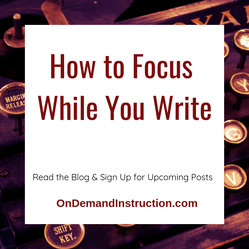
Today, we are distracted, overwhelmed, and overworked which can leave us drained of creative energy by the end of the day. When we have time to write, the critical voices in the backs of our heads can get loud as we attempt to focus. Instead of enjoying our writing time and making efficient progress, many of us dabble in our writing between checking email, social media, and researching the obscure question. Setting aside writing time is hard enough, but when we use our writing time poorly, we can leave the desk feeling defeated.
One of the biggest obstacles for writing is focus. Many writers mean well and want to engage in the creative process and make progress on their projects. But when we sit down to write, we wander off task and end up down the rabbit hole of distraction—which makes our writing time feel like a waste. With the pull of social media, the responsibilities of work emails, and the curiosity of writers to find a quick answer to a question, how do we control the urges that interrupt our writing and draw us toward the path of distraction? In all honestly, it isn’t easy. But successful writers set limitations for themselves and dedicate themselves to the craft. Here are a few strategies you can use to maintain focus when writing:
Leave the House
I have an image in my mind of the perfect writing setting. In a beautiful home office, I have a huge desk that sits beside a window that looks out on gorgeous scenery of trees and flowers. On my desk sits my antique typewriter to inspire me to keep writing. I spend hours and hours tapping away at the keyboard. In reality, I have a hand-me-down standing desk in the corner of my daughter’s bedroom. The desk isn’t even mine, because she got a planter for her birthday so I have to share the desk with her planter. Every time I go in there to write, the frustration of being a grown adult without a real desk eats at me, the pile of laundry in the corner of the bedroom shouts to be cleaned, and the mismatched books on the shelf call me away from my writing project. Writing at home is nearly impossible for me. There is no end to laundry. The dog wants to go out. The cat walks across my keyboard. I need another cup of coffee. The dog wants to come back in. I really should vacuum the living room. Who left that cup without a coaster? The dog wants to go out again. The coffee is done, so I pour a cup. No one has dusted the bookshelves in a month. And I still haven’t written a word. To focus on writing, I have to leave the house. My two favorite places to go are the library and the coffee shop near my house. These days, it is totally normal to show up at a coffee shop with your computer in tow and plop down for a couple of hours to work. Millennials live at Starbucks for pity’s sake; they figured it out. If working at home leaves you with a blank sheet of paper at the end of an hour, then leave. Find a public place where you can write.
Control the Net
Each of us has a different poison. Is yours Facebook? Instagram? Pinterest? Work emails? Googling weird questions related to the novel you are writing? What is it that pulls you away from writing and wastes your time? For me, email (both my personal and my work) pull me in. Escape the control the internet holds over your writing time by blocking the sites. One option is to turn off the internet access on your computer. Most computers have an option to shut down the internet with a toggle switch. If yours does not, then disconnect from the internet by going into the internet settings and disconnecting from the Wi-Fi source. If you are like me, you might turn off the internet and then want to turn it back on after five minutes because you have a question about how far a person can fall before they break a leg or what is the difference between rhinovirus and the flu. Writers are curious creatures and tend to research while they write. Instead of researching in the moment, insert the question into your writing and come back to it later. This will keep you focused on writing and off the web. If social media or specific websites work to your detriment, you can also use a browser blocker to keep yourself off of them. For example, if you find that you check Instagram 30 times in 15 minutes when you are supposed to be writing, then block the site during your writing time. Browser blocking sites include: Stay Focused, Freedom, Focal Filter, and Waste No Time. There are dozens more, so find one that fits your preferences.
Unplug the Phone
I have a writer friend who shows up to her writing time with her phone in hand. We write together with a group of people once a month, and her pattern is the same every time. She opens her computer and turns it on. Then she pulls out her phone and starts searching the web. For two hours, she will search around the web on her phone and not write a single word. If this is a challenge you face, leave the phone at home so it isn’t there to distract you. Create Tools to Focus For some writers, the computer is an impossible tool. There are just too many distractions, the pull of the web is too great, and the multitude of files is impossibly interesting. No one should be surprised that the computer is an inefficient tool for many people, regardless of the promise that technology will solve our problems. Instead of using a computer to write, choose a different tool and improve your focus. Plug in headphones with music. Have you ever looked at people working on their laptops in public? Many of them are wired into music while they’re working. Listening to music blocks out the noise around you and can help you focus. For me, I go to YouTube and search for classical music for studying, because jazz or classical music works well to keep me on task. Another option is to dump the computer entirely. Instead, write with an old-fashioned typewriter. Yes, this is a thing. Some people, including playwright Sam Shepard and writer Tom Hanks, compose on typewriters rather than laptops. The feel is different, the focus is much easier, and the mind has nowhere to wander. If a typewriter doesn’t work for you, buy a paper notepad and a decent pen. I teach writing workshops to adults and we use paper and pen to write. Sometimes, people say that using a pen is uncomfortable because they are used to using a computer, but in an afternoon-long workshop, I can get them to write several pages more than they would have on a laptop.
Plan to Write
Finally, if you are serious about writing and using your writing time efficiently, set a goal for each writing session. Before you sit down to write, do these three things: set your goal, create your plan, and decide how you will keep yourself accountable. Your goal might be to finish the chapter you are working on or to write a certain number of words. Set a realistic goal that you know you can achieve but don’t set the bar so low that you are bored and open yourself up to distractions. For me, I can write 1,000 words in an hour if I am focused. Time yourself and determine what your production rate is, then use it as a guide for your goal. Create a plan by listing the steps you need to take to reach that goal. If you can write 1,000 words in an hour, do you need to break that into smaller chunks to make it manageable? Are you really writing ten paragraphs that are 100 words each or four sections that are 250 words each? Break down your writing goal in a way that makes sense to keep yourself moving forward. The last thing to consider is how you will keep yourself accountable. I have a writer friend who will text me and say, “I am writing 1,000 words by noon today.” I’ll get her text and send back a smiley face or a few words of support. Around noon, she texts me when she hits the goal. She and I created this system to keep each other accountable, and it helps us stay on task while we write. If you don’t have a writing partner, is there a carrot that you can offer yourself when you meet your goal (if I make my goal, I’ll buy myself a latte or give myself 30 minutes of goof-off time)? The unfortunate truth is that technology hasn’t really solved our problems. Rather it has complicated our lives and made it harder for creatives to set aside time to engage in the craft. But if we can identify what is holding us back from creating as efficiently and effectively as we want to, then we can improve our processes and use our writing time well. Related Blog Posts
|
About the SiteWelcome, Writers! Archives
September 2023
|







 RSS Feed
RSS Feed